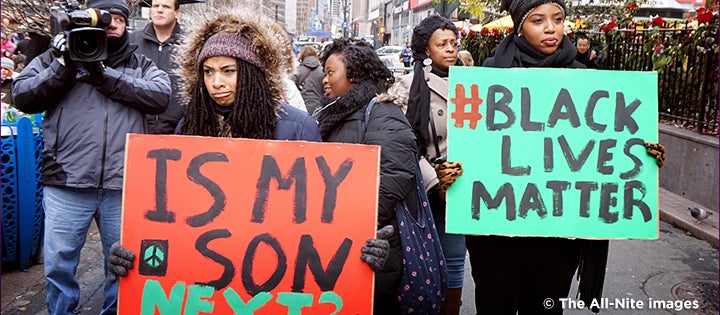Para leer en español, haz click aquí
Since 2010, the world has witnessed a tremendous civil society uprising in the U.S. as a result of the deaths of unarmed black men and women in the hands of the police. We all have heard about the high profile cases of Freddie Gray, Michael Brown, Eric Garner, Trayvon Martin, or the recent suspicious case of Sandra Bland. The hashtag #blacklivesmatter, which began in 2013, has been so popular in mobilizing activists that its creators have met with U.S. President Barack Obama and other prominent leaders to make demands.
Much like the U.S, it appears that police victims in some countries in Latin America are disproportionately black. In August 2015, over 5,000 Brazilians took to the streets of Salvador in Bahia to protest for the deaths of unarmed black youth by the police.
Movements like Black Lives Matter are incredibly effective at mobilizing and calling attention to societal problems that have always existed but that no one ever paid attention to. Material evidence (i.e tape recordings and camera footage) gave birth to the BLM movement and as a result, major policy changes are now being seriously discussed, such as demilitarization of the police, body cameras and across-the-border procedural justice training.
The question that I ask myself is whether or not, in the absence of publicity, criminal justice systems in the U.S and likewise in Latin America and Caribbean would have been able to identify bias and prevent the unnecessary deaths of people because of their ethnic background. I would say yes, but only if the criminal justice system, civil society and academics had had the right data and tools to preempt racial/ethnic bias.
According to the Brazilian Public Safety Forum, an independent research group, at least 2,212 Brazilians were killed by the police in 2013. And data for São Paulo on deaths resulting from police raids shows that the death rate of blacks is almost 3 times higher than whites. According to the 2012 Brazilian National Victimization Survey the chance of an unmarried black man aged 25-34 living in the Southeast Brazilian region being victim of police violence is 1.37 times the chances of a white person in the same condition.
Pros and cons of collecting race or ethnicity-based data
So, should criminal justice systems collect, analyze and disseminate race or ethnicity-based data? Certainly yes, but we have to recognize that there are potential misuses of race and ethnicity data. For example, disseminating inaccurate or incomplete disaggregated data on the profile of perpetrators can reinforce stereotypes and justify discrimination against particular racial/ethnic group. Also, data showing bias within the system can increase public distrust damaging the reputation of the criminal justice system. There is also a methodological debate over the use of race self-identification and the need of other relevant information to contextualize any existing correlation of race and crime (poverty, family background, mental health, social alienation, etc.).
However, the potential uses of collecting race and ethnicity data far outweigh its potential misuses. Without data, it is impossible to identify systematic racial biases within criminal justice systems and address them. Data not only helps to understand why some racial/ethnic groups are more vulnerable to crime victimization and offending than others but also it can be used to evaluate targeted crime prevention programs.
Countries like U.S., Brazil, Canada or Colombia are already working on this and in my next post I will share their experiences and findings.


Leave a Reply